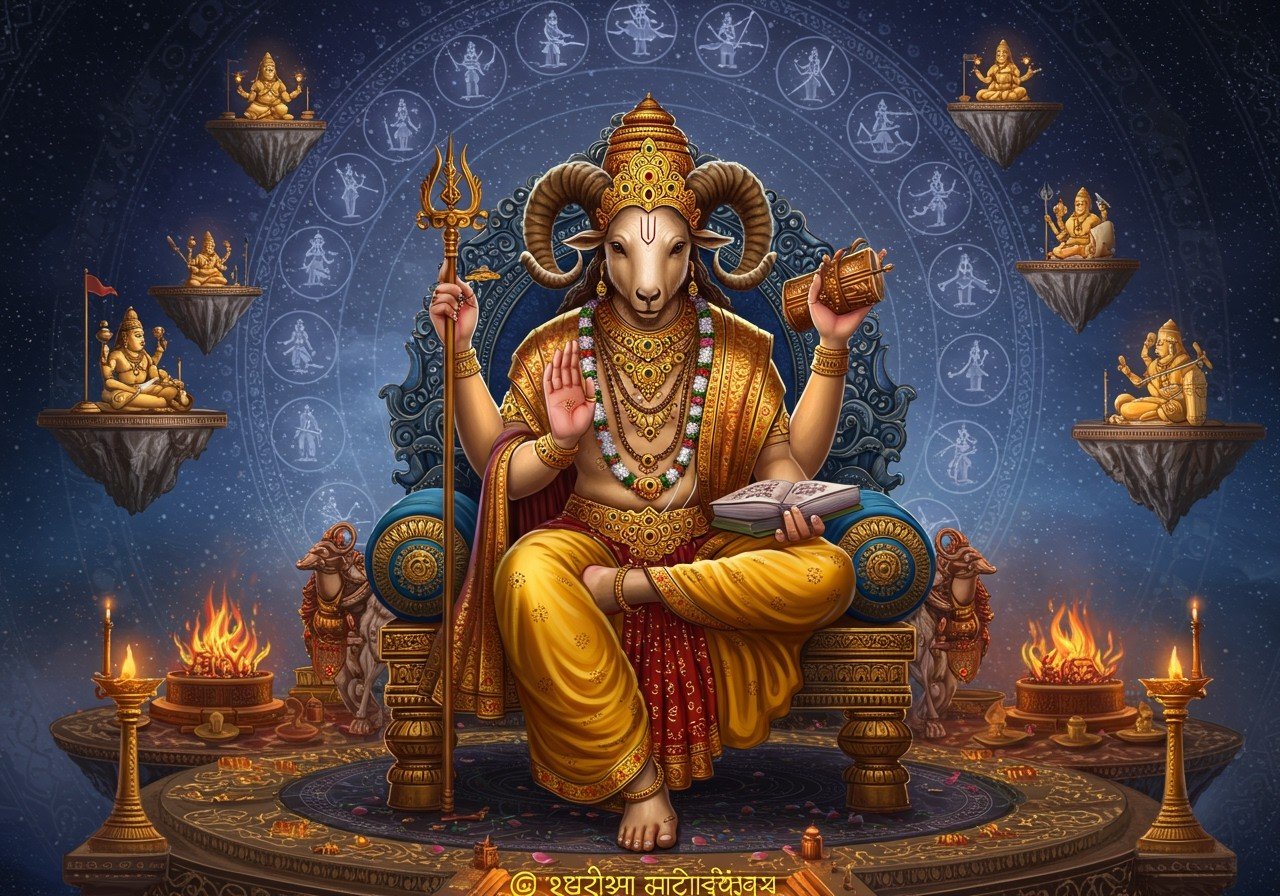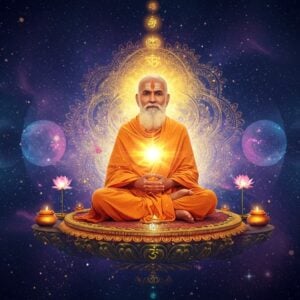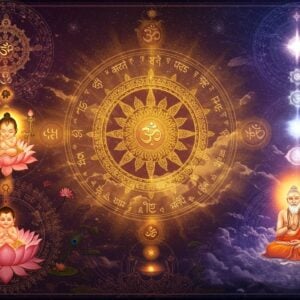
Embark on a journey through the intricate tapestry of Hindu mythology by uncovering the tale of Daksha, a significant yet sometimes overlooked figure. Daksha’s role in Hinduism provides insight into cultural and religious practices that continue to influence traditions today. This exploration connects deeply with those who value authenticity in ritual items and uphold time-honored customs.
Understanding Daksha – The Competent Progenitor
In Hindu mythology, Daksha signifies ‘competent’ or ‘able’. As a Prajapati, or progenitor, he plays a crucial role in the creation and maintenance of the universe. Mentioned in both the Vedas and Puranas, Daksha symbolizes order, discipline, and authority. These concepts are vital in Hindu rituals and practices, offering a framework for devotees seeking balance and harmony. His divine role emphasizes his position as a god of ritual and order, and his interactions with deities like Shiva and Brahma highlight themes of ego, reconciliation, and cosmic balance. The narrative of Daksha’s yajna (sacrifice) and conflict with Shiva teaches valuable lessons on humility and devotion for devotees.
Asikni, Daksha’s consort, also holds significance in mythology. Their union brought forth various beings, including the Saptarishi (seven sages), reflecting themes of fertility and creation essential to Hindu traditions, rituals, and festivals. Daksha’s influence on rituals, especially yajna or sacrificial ceremonies, demonstrates the enduring power of traditions in religious practices. His legacy, reflected in art and literature, symbolizes authority and order, while festivals celebrating his story connect cultural heritage with contemporary Hindu practices.
Origins and Lineage of Daksha
Daksha’s origins in Hindu mythology are multifaceted, adding depth to his character. The Rigveda identifies him as an Aditya, a son of Aditi. The epics and Puranas present him as a Manasputra, born from Brahma’s mind or even his right thumb. Some texts suggest he was born to Prachetas and Marisha. This rich tapestry of origin stories emphasizes Daksha’s primordial role in the act of creation itself.
Associated with the Daksha Gotra, a lineage carrying forward his legacy, Daksha, as one of the Prajapatis, bears the responsibility of populating the universe—a testament to his competence and authority. This crucial role in maintaining cosmic balance through creation underscores his significance in Hindu cosmology.
Daksha’s Role and Responsibilities
Daksha’s responsibilities transcend creation. As a divine king-rishi, he upholds universal principles and societal norms, embodying Dharma and order. His association with Vedic rituals and sacrifices further emphasizes the importance of discipline and duty. Daksha is often depicted as a strict administrator. This characteristic reflects the Hindu value placed on structure and harmony, both in the cosmos and in our daily lives. His stories teach us the significance of maintaining order in all spheres of existence.
Family Ties: Daksha and Prasuti
Daksha’s familial connections deepen his integration into the mythological narrative. Married to Prasuti, he fathers many daughters, including Sati, Aditi, and Diti. Each daughter plays a crucial role in Hindu mythology, becoming progenitors of various beings. These familial ties emphasize creation and continuity – essential elements of Hindu traditions. Through his daughters, Daksha’s influence permeates numerous mythological narratives, connecting him to various deities and pivotal cosmic events.
The Tale of Daksha and Sati
Perhaps the most renowned story of Daksha revolves around his daughter Sati and her marriage to Lord Shiva. Daksha’s disapproval of their union led him to exclude them from a grand Yajna he organized. Feeling the sting of insult and grief, Sati chose self-immolation in the sacrificial fire. Shiva, enraged by this tragic act, unleashed Virabhadra to disrupt the Yajna and behead Daksha. Daksha was later revived, but with a goat’s head – a symbolic representation of the humbling consequences of pride and arrogance.
This poignant narrative explores themes of ego, reconciliation, and the delicate balance of the cosmos. It serves as a timeless reminder of the importance of humility and respect within relationships, particularly familial ones. The story’s dramatic events highlight the interplay of human emotions and divine consequences.
Significance and Cultural Impact
Daksha’s stories impart profound lessons about duty, discipline, and devotion. They reveal how unchecked ego can disrupt harmony, offering valuable guidance for maintaining balance in life. His complex relationship with Shiva underscores the dynamic interplay between creation and destruction, vital for cosmic equilibrium. These narratives offer timeless wisdom, applicable to both personal and societal levels.
Daksha’s legacy resonates deeply within contemporary Hindu practices through rituals and festivals. These observances honor his contributions to maintaining cosmic and societal order. For those who value tradition and seek authentic ritual items, his story connects the past to the present, weaving cultural heritage into the fabric of modern Hinduism.
How Poojn Helps You Honor the Legacy of Daksha
Poojn.in simplifies the process of acquiring authentic puja items for worshipping Lord Shiva, enabling you to maintain sacred traditions. Explore our collection:
- Pure copper and brass items for abhishekam rituals: Browse our brass collection. These meticulously crafted items add a touch of tradition to your rituals, ensuring purity and authenticity.
- High-quality rudraksha malas in different sizes: Discover our range of Rudraksha malas. Choose from various sizes to find the perfect fit for your spiritual practice and enhance your connection with the divine.
- Traditional bel patra and other sacred leaves: Sourced with utmost care and reverence, our selection of sacred leaves, including bel patra, adds an element of traditional sanctity to your offerings.
- Pure silver items for Shiva worship: Elevate your devotion with our exquisite collection of pure silver items, crafted to enhance your connection with Lord Shiva. These items are made with the finest quality silver, ensuring purity and long-lasting beauty.
- Authentic vibhuti (sacred ash) from trusted sources: Our vibhuti is sourced from trusted locations, ensuring its authenticity and sanctity for your spiritual practices. We maintain strict quality control to ensure purity and adherence to traditional standards.
- Complete Shiva puja sets with all essential items: Simplify your puja preparations with our complete Shiva puja sets. Find everything you need in one place. Each set includes all the essential items for a fulfilling and meaningful puja experience.
All items are packaged securely to preserve their purity and delivered across India with utmost care and respect. Our dedicated team is available to assist you in selecting the right products for your specific puja needs, offering personalized guidance and support.
To order puja items:
- Visit www.poojn.in
- Call us: 03369029784
- WhatsApp: 9476142738
Our experts are available to guide you in selecting the most suitable items for Shiva worship according to traditional requirements. We ensure all products meet the highest standards of religious purity and authenticity.
Conclusion: Embracing Daksha’s Legacy
Daksha’s story, interwoven within the vast tapestry of Hindu mythology, offers timeless wisdom. His journey as a creator, enforcer, and father imparts invaluable lessons on duty, discipline, and the crucial role of maintaining harmony. His interactions with divine figures like Shiva and his familial bonds illuminate the delicate balance between ego and humility, order and chaos. Daksha’s legacy endures through rituals and cultural practices, a testament to the enduring values that underpin our traditions. As we partake in festivals and rituals, we honor his contributions to the cosmic and societal balance, ensuring that his story continues to guide us on our path.
FAQs About Daksha’s Legacy: Exploring the Myth and Meaning
What does Daksha mean? Daksha means “able” or “skillful,” a fitting name for a figure known for his capabilities and wisdom in Hindu mythology. This name reflects his role as a creator and upholder of cosmic order.
What is Daksha the god of? Daksha is not specifically a god of a particular domain but rather a Prajapati, a progenitor or creator. His significance lies in his role in creation myths and his influence on cosmic order.
Who is Daksha’s wife? Daksha’s wife is Asikni. Their union is significant in mythology as it leads to the birth of many daughters who play essential roles in various myths and legends.
How is Daksha related to Lord Shiva? Daksha is Lord Shiva’s father-in-law. His daughter, Sati’s, marriage to Shiva is a central and pivotal narrative in Hindu mythology.
What is the story of Daksha and Sati? Daksha disapproved of Sati’s marriage to Shiva, culminating in a grand sacrifice where Sati’s self-immolation sparked significant events, highlighting themes of familial conflict and divine intervention.
Why is Daksha’s sacrifice important? Daksha’s sacrifice, though ultimately disrupted, marks a key event in Hindu mythology. It underscores themes of pride, sacrifice, and the eventual reconciliation with Shiva.
How is Daksha depicted in mythology? Daksha is typically portrayed as a wise and authoritative figure in Hindu texts. Due to a curse, he is sometimes depicted with a goat’s head, symbolizing humility and the consequences of arrogance.
What lessons can we learn from Daksha’s story? Daksha’s story offers profound lessons about the pitfalls of pride and the importance of understanding and acceptance in relationships. His narrative underscores the significance of humility in navigating both interpersonal and spiritual life.
Learn more about Hindu Gods and Goddesses: A Complete Guide to the Pantheon


